| 6 March 2007 [1] The former director of the Tuol Sleng torture center, Kaing Kek Iev, better known as Duch the Butcher, has just had his detention in a military prison extended for the second time, until November, 2008. He was detained in 1999 and has been held without trial ever since. Under Cambodian law, a person may be held without trial for six months at most, but there is an exclusion for those charged with war crimes, genocide, and crimes against humanity which allows a person to be held for three years during which time the detention must be renewed annually. Duch has been successively charged with each of the above crimes and so must be tried or released by November, 2008. Under the UN's International Convention on Civil and Political Rights, every person charged must be tried "without undue delay," but the military judge has said that Duch's imprisonment is not an international matter--although the courts being set up to try him are deliberately comprised of Cambodian and international judges. [2] The Cambodian Human Rights Action Committee--a coalition of 23 NGOs working with human rights--has called on the Extraordinary Chambers in the Cambodian Courts (ECCC) to finish work and finalize by April the procedural rules which will allow the KR tribunal to begin. Guarantees must be enacted to insure the independence of the judicial process and to protect the rights of the victims and accused. [3] 60 Cambodian lawyers are to receive training to prepare them to participate in the ECCC. A previous attempt to offer such training was scuttled by the Cambodian Bar Association which felt that it had been bypassed. Now the training is to be provided by the Khmer Rouge tribunal's Defense Support Section, the International Bar Association--and the Cambodian Bar Association, a dodgy group which limits the number of lawyers available to the country and feuds about who is and isn't its president.
|
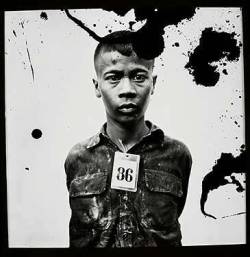 The saga of the Khmer Rouge trials continues--slowly, the way the government wants it--and there is a lot of interesting news to report. My previous format was inconvenient to update and read, however, so I am introducing a new format that will allow easier insertion of daily events. A backlog of items starting in May will be posted first to catch up to the present day.
The saga of the Khmer Rouge trials continues--slowly, the way the government wants it--and there is a lot of interesting news to report. My previous format was inconvenient to update and read, however, so I am introducing a new format that will allow easier insertion of daily events. A backlog of items starting in May will be posted first to catch up to the present day.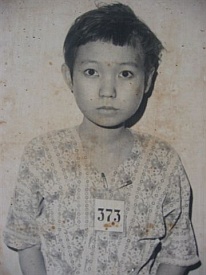
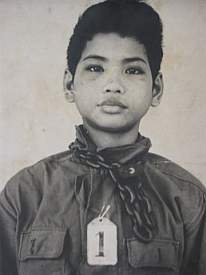
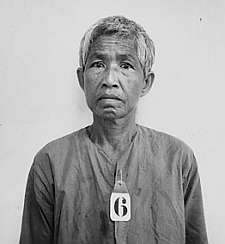 For about a year now, the United Nations has been asking Cambodian authorities to investigate charges of corruption, specifically the allegation that Cambodian officials, including judges, were requiring kickbacks from the persons they appointed to official positions at the Khmer Rouge tribunal. A complaint lodged with the courts asked for investigation of Cabinet Minister Sok An (a Deputy Prime Minister and one of the most powerful people in Cambodia), the tribunal Director of Administration, and the former chief of tribunal personnel. A previous UN investigation reportedly called for a full investigation, but instead now the prosecutor has announced suddenly that the investigation is being dismissed after less than a month of work. No reason was given, and an official hung up the phone when contacted. The Cambodian government has all along resisted the call for investigation so it seems the investigation may have been leading in a direction that the government couldn't control. [Photo of a Khmer Rouge victim]
For about a year now, the United Nations has been asking Cambodian authorities to investigate charges of corruption, specifically the allegation that Cambodian officials, including judges, were requiring kickbacks from the persons they appointed to official positions at the Khmer Rouge tribunal. A complaint lodged with the courts asked for investigation of Cabinet Minister Sok An (a Deputy Prime Minister and one of the most powerful people in Cambodia), the tribunal Director of Administration, and the former chief of tribunal personnel. A previous UN investigation reportedly called for a full investigation, but instead now the prosecutor has announced suddenly that the investigation is being dismissed after less than a month of work. No reason was given, and an official hung up the phone when contacted. The Cambodian government has all along resisted the call for investigation so it seems the investigation may have been leading in a direction that the government couldn't control. [Photo of a Khmer Rouge victim]
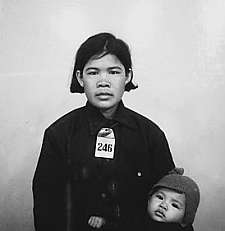 A survey taken this month of attitudes and understandings about the Extraordinary Chambers of the Courts of Cambodia revealed a distressing lack of knowledge about the ECCC and the progress of the Khmer Rouge trials. 85% of those surveyed stated they had little or no knowledge of the activities of the tribunal.
A survey taken this month of attitudes and understandings about the Extraordinary Chambers of the Courts of Cambodia revealed a distressing lack of knowledge about the ECCC and the progress of the Khmer Rouge trials. 85% of those surveyed stated they had little or no knowledge of the activities of the tribunal.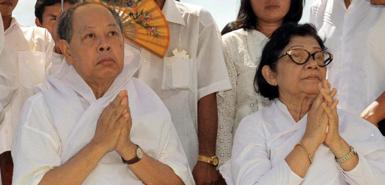 Five high-level Khmer Rouge cadres are in the custody of the Extraordinary Chambers of the Cambodian Courts which is prosecuting them for their actions during the Pol Pot era. Two of those detained are husband and wife, Ieng Sary, the KR Foreign Minister, and his wife, Ieng Thirith, the Social Action Minister for the KR. All five detainees are allowed visitors and external communications by mail, but they are not allowed to communicate with each other to prevent them from colluding and coordinating stories during the investigation. However, because Ieng Sary and Thirith are married, the tribunal judges have ruled they may meet once a day in person.
Five high-level Khmer Rouge cadres are in the custody of the Extraordinary Chambers of the Cambodian Courts which is prosecuting them for their actions during the Pol Pot era. Two of those detained are husband and wife, Ieng Sary, the KR Foreign Minister, and his wife, Ieng Thirith, the Social Action Minister for the KR. All five detainees are allowed visitors and external communications by mail, but they are not allowed to communicate with each other to prevent them from colluding and coordinating stories during the investigation. However, because Ieng Sary and Thirith are married, the tribunal judges have ruled they may meet once a day in person.
 Nuon Chea, Brother No. 2 and the most senior Khmer Rouge leader still alive, is now imprisoned in the detention center at the tribunal site. His wife Ly Kimseng has now visited her husband for the first time and has pronounced herself satisfied with the arrangements. Earlier she had said he needed a thicker mattress and a western-style toilet and both of those were provided. She said her husband, 82, now is being well taken care of and that he exercises every day, sits in the sun, and reads books about Buddhism. Picture from ABCNews.com]
Nuon Chea, Brother No. 2 and the most senior Khmer Rouge leader still alive, is now imprisoned in the detention center at the tribunal site. His wife Ly Kimseng has now visited her husband for the first time and has pronounced herself satisfied with the arrangements. Earlier she had said he needed a thicker mattress and a western-style toilet and both of those were provided. She said her husband, 82, now is being well taken care of and that he exercises every day, sits in the sun, and reads books about Buddhism. Picture from ABCNews.com]
 One of the many members of the Cambodian royal family, Prince Sisowath Thomico, has sent a letter to the Prime Minister, Hun Sen, asking that the Extraordinary Chambers of the Courts of Cambodia--the Khmer Rouge tribunal--be stopped. The prince, formerly a secretary to the retired king, is now an advisor to the president of one of the political parties. His request is based on his belief "that this ECCC will really cause political chaos, inevitably making our country lose peace and stability in the future." This letter seems to have been triggered by the request of a somewhat obscure US-based group that the retired king be called to testify about his involvement with the Khmer Rouge. Prince Thomico apparently felt that he should add his opinion to that controversy and to the general question of the efficacy of the KR tribunal and its ability to bring healing and reconciliation to the people who were victims of the Khmer Rouge.
One of the many members of the Cambodian royal family, Prince Sisowath Thomico, has sent a letter to the Prime Minister, Hun Sen, asking that the Extraordinary Chambers of the Courts of Cambodia--the Khmer Rouge tribunal--be stopped. The prince, formerly a secretary to the retired king, is now an advisor to the president of one of the political parties. His request is based on his belief "that this ECCC will really cause political chaos, inevitably making our country lose peace and stability in the future." This letter seems to have been triggered by the request of a somewhat obscure US-based group that the retired king be called to testify about his involvement with the Khmer Rouge. Prince Thomico apparently felt that he should add his opinion to that controversy and to the general question of the efficacy of the KR tribunal and its ability to bring healing and reconciliation to the people who were victims of the Khmer Rouge.
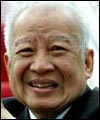 A US-based NGO called the Cambodian Action Committee for Justice and Equity has called for the King Father (King Sihanouk, who retired in November, 2005) to have his immunity lifted by the National Assembly so that his links with the Khmer Rouge can be fully investigated. For a short time, King Sihanouk was the symbolic head of state for the KR's Democratic Kampuchea before he was then placed under house arrest in his palace for the duration of their rule.
A US-based NGO called the Cambodian Action Committee for Justice and Equity has called for the King Father (King Sihanouk, who retired in November, 2005) to have his immunity lifted by the National Assembly so that his links with the Khmer Rouge can be fully investigated. For a short time, King Sihanouk was the symbolic head of state for the KR's Democratic Kampuchea before he was then placed under house arrest in his palace for the duration of their rule. François Bizot is the only foreigner imprisoned by the Khmer Rouge to survive. A Frenchman, he was in Cambodia to research Buddhism and was captured by the Khmer Rouge in 1971 and detained in a prison on charges of being a CIA agent. He developed a strange relationship with Duch, the KR cadre who later became head of the Tuol Sleng torture center, and eventually it was Duch who convince the KR leadership that he was innocent. Bizot was released and was later expelled from the country with the other foreigners in 1975. The Cambodia Daily published an article about him and his recollections of his captivity and his captor Duch. Some excerpts:
François Bizot is the only foreigner imprisoned by the Khmer Rouge to survive. A Frenchman, he was in Cambodia to research Buddhism and was captured by the Khmer Rouge in 1971 and detained in a prison on charges of being a CIA agent. He developed a strange relationship with Duch, the KR cadre who later became head of the Tuol Sleng torture center, and eventually it was Duch who convince the KR leadership that he was innocent. Bizot was released and was later expelled from the country with the other foreigners in 1975. The Cambodia Daily published an article about him and his recollections of his captivity and his captor Duch. Some excerpts:
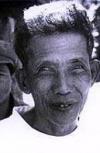 [The] director of the Center for Social Development, argued that the court must prosecute more people to justify its $56 million price tag. "The more people in the dock, the greater the likelihood that a clear accounting of history will be had....
[The] director of the Center for Social Development, argued that the court must prosecute more people to justify its $56 million price tag. "The more people in the dock, the greater the likelihood that a clear accounting of history will be had....